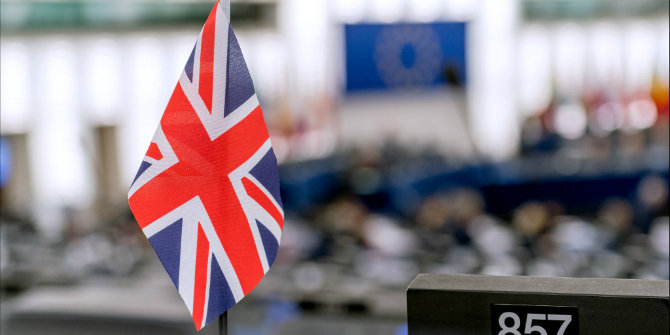Anyone who imagines that Brexit has been ‘done’ is in for a rude awakening, writes Joelle Grogan (Middlesex University). The hard work of negotiating a deal in a mere 11 months is only just beginning.
From 11.01pm (or 12.01pm Brussels time) on 31 January 2020, the UK will no longer be a Member State of the European Union. The Withdrawal Agreement between the UK and the EU which determines the process of the UK’s departure from the EU was signed in Brussels on 28 January 2020. For all the rancorous debate over its initial introduction and content, the European Union (Withdrawal Agreement) Act 2020, which was required for ratification of the Agreement and its implementation in the UK, passed the new Parliament with little coverage and (outside the House of Lords) less debate. Following the December election, the Conservative party have a significant majority in Parliament, and Prime Minister Boris Johnson is unlikely to face any significant domestic opposition on his policies.

Four years of political and legal dysfunction have taken their toll, and the message of ‘Get Brexit Done’ has no doubt great appeal to an exhausted, frustrated and deeply divided British electorate. Marking the British exit from the EU, the Department for Exiting the European Union along with its minister will end their tenure and functions at the same minute as the UK departs from the Union. For all external PR, it appears to be a fait accompli: Brexit is done. However, the reality is that Brexit has only just begun.
Brexit is a process, not a minute past midnight
Following withdrawal on 31 January, the process of UK withdrawal from the EU will begin. The UK will enter the transition period as dictated under the terms of the Withdrawal Agreement. During the transition period, the UK will continue to apply EU law including any new legal provisions, (and apply them beyond that) though without having direct control or input over them (itself raising a whole host of judicial oversight and democratic input concerns, particularly when paired with the provisions of the Withdrawal Agreement). During the transition period, the UK and EU will negotiate and are expected to ratify a new treaty, based on the agreed provisions of the Political Declaration, which will govern the future relationship between the UK and the EU.
Unlike Article 50, which will no longer be relevant, the transition period does not have a mechanism for extension based on a request from the UK and the unanimous agreement of the EU27. The transition period is due to end in December 2020, and the Withdrawal Agreement allows for only one extension of two years until 31 December 2022. While it has taken three years and ten months for the ratification of the Withdrawal Agreement, there is an expectation that one of the most complicated, and comprehensive, agreements in UK history will be concluded within a fraction of that time.
Even at its most superficial, this future agreement must address not only issues of trade and economic cooperation, but also questions of services and mobility, transport and aviation, data transfer, investment, competition and state aid, law enforcement and criminal justice, and even matters of foreign policy, security and defence. In absolute terms, the ostensibly intractable issues of the Withdrawal Agreement – citizens’ rights, and the financial settlement (though with the exception of the Northern Ireland border) – would appear to be relatively straightforward in comparison.
The UK will be asked to (re)consider the contentious point of the guarantee of a level playing field between the UK and EU on areas such as consumer, worker, and environmental protections. This guarantee had already been moved from the legally-binding Withdrawal Agreement to the Political Declaration on the future relationship in an effort to make the former more palatable to the then UK Parliament. Concerns for legal certainty, judicial review and oversight, and democratic input that have been consistently raised in context of the Withdrawal Agreement will be compounded in a future agreement between the UK and the EU particularly where time to determine the legally-enforceable details, rather than political promises, is (currently) eleven months and a no-deal Brexit is still a default legal possibility.
A UK Parliamentary majority – as evidenced by the quiet passage of the EU (Withdrawal Agreement) Act 2020 – will not necessarily guarantee an optimal outcome in Brexit negotiations. For the EU, Brexit has not presented the existential crisis that it has for the internal constitutional mechanics and politics of the UK. A far more serious existential threat is how to prevent and effectively respond to member states and in particular, Hungary and Poland, which are subject to special EU scrutiny under Article 7(1) TEU for breaches of the EU’s fundamental value of the rule of law. The EU never expected either Article 50 TEU nor Article 7 TEU to be activated, and certainly never both at the same time. It is by no means certain it can find a way to ensure the UK’s continued access to the internal market which, from the EU member states’ perspective, neither compromises the functioning of the Single Market and the four freedoms, nor incentivises bilateralism as concerns for a downward regulatory trajectory mount, nor causes severe economic damage to the UK and the EU.
Few changes on 1 February
For the great majority of those waking in the UK and across the EU on 1 February 2020, the changes brought about by withdrawal are largely insignificant. However, some may quickly be noticed: there will be no British MEPs, nor a British Commissioner, and the British Prime Minister will no longer be part of the EU Council. UK citizens will no longer be EU citizens, nor be guaranteed its related rights and freedoms. New questions of the mobility of UK and EU citizens will arise as the UK shifts away from EU freedom of movement.
Some of these changes, however, may be far more significant and far-reaching, as some Member States too will begin to treat the UK as beyond the scope of EU law and outside of the obligations of mutual trust. For example, some EU member states have indicated that they will not recognise a European Arrest Warrant from the UK when it leaves the EU.
In all of the uncertainty as to what the future will look like, there is one certainty: Brexit is done, and Brexit has only just begun.
This post represents the views of the author and not those of the Brexit blog, nor LSE.







What most are unaware of is that the British economy depends upon growth and the UK is already 10 million hardworking immigrants behind – soon they will open the doors to traditional hardworking immigrants now that they have closed the door to EU dole jumpers. White House needs come first.